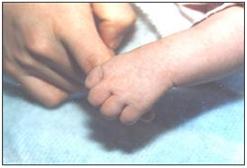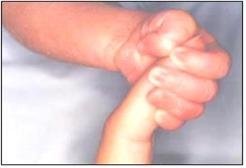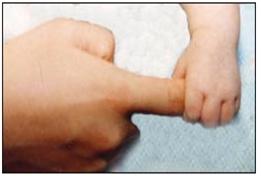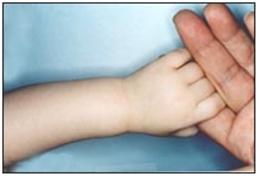파악 반사(움켜잡기 반사), Grasp reflex
- 신생아나 생후 2∼3개월 영아의 손바닥에 엄마 아빠의 손가락을 갖다 대면 손가락과 손바닥을 꼭 오므려 자기 엄마 아빠의 손가락을 꼭 잡는다.
- 이런 반사를 파악 반사라고 한다.
- 파악 반사는 원시 반사의 일종이고 인간 생명유지 행동반사이다.
- 이 파악 반사는 생후 3~4개월 지나면 자연히 없어진다.

사진 2-83.신생아나 생후 2∼3개월 된 영아의 손바닥에 엄마 아빠의 손가락을 대면 자기의 손가락과 손바닥을 꼭 오므려 자기 손바닥에 닿는 엄마나 아빠의 손가락을 꼭 잡는다. 이런 반사를 파악반사라고 한다.
Copyright ⓒ 2012 John Sangwon Lee, MD., FAAP

사진 2-84.신생아나 생후 2∼3개월 된 영아의 손바닥 에 엄마 아빠의 손가락을 대면 자기의 손가락과 손바닥을 꼭 오므려 자기 손바닥에 닿는 엄마 아빠의 손가락을 꼭 잡는다. 이런 반사를 인간 생명유지 행동반사라고도 한다.
Copyright ⓒ 2012 John Sangwon Lee, MD., FAAP

사진 2-85.신생아가 무의식적으로 엄마의 손가락을 잡고 있다. 이런 반사를 파악 반사라고 한다. 여기서 엄마와 자식도 신체적 접촉사랑을 하고 있다.
Copyright ⓒ 2012 John Sangwon Lee, MD., FAAP

사진 2-86.신생아가 무의식적으로 엄마의 손가락을 잡고 있다. 이런 반사를 파악 반사라고 한다.
Copyright ⓒ 2012 John Sangwon Lee, MD., FAAP
Grasp reflex
If the mother puts her finger on the palms of a newborn baby or two to the three-month-old infant, a newborn will hold her mother’s fingers by squeezing her fingers and palms together. This reflex is called the grasp reflex. The grasp reflex is a type of primitive reflex and is a human life support behavioral reflex. This grasping reflex disappears spontaneously after 3 to 4 months of age.

Picture 2-83. When her mother puts her fingers on the palms of her newborn, the newborn will squeeze the mother’s fingers. This reflex is called the grasp reflex. Copyright ⓒ 2012 John Sangwon Lee, MD., FAAP

Picture 2-84. When her mother puts her fingers on the palms of her newborn, the newborn will squeeze the mother’s fingers. This reflex is also called the human life support behavioral reflex. Copyright ⓒ 2012 John Sangwon Lee, MD., FAAP

Picture 2-85. A newborn baby is unconsciously holding her mother’s finger. This reflex is called the grasp reflex. Here a mother and her child are also making physical contact love. Copyright ⓒ 2012 John Sangwon Lee, MD., FAAP

Picture 2-86. A newborn baby is unconsciously holding her mother’s finger. This reflex is called the grasp reflex. Copyright ⓒ 2012 John Sangwon Lee, MD., FAAP
출처 및 참조문헌
- www.drleepediatrics.com 제1권 소아청소년 응급 의료
- www.drleepediatrics.com 제2권 소아청소년 예방
- www.drleepediatrics.com 제3권 소아청소년 성장 발육 육아
- www.drleepediatrics.com 제4권 모유,모유수유, 이유
- www.drleepediatrics.com 제5권 인공영양, 우유, 이유식, 비타민, 미네랄, 단백질, 탄수화물, 지방
- www.drleepediatrics.com 제6권 신생아 성장 발육 육아 질병
- www.drleepediatrics.com제7권 소아청소년 감염병
- www.drleepediatrics.com제8권 소아청소년 호흡기 질환
- www.drleepediatrics.com제9권 소아청소년 소화기 질환
- www.drleepediatrics.com제10권. 소아청소년 신장 비뇨 생식기 질환
- www.drleepediatrics.com제11권. 소아청소년 심장 혈관계 질환
- www.drleepediatrics.com제12권. 소아청소년 신경 정신 질환, 행동 수면 문제
- www.drleepediatrics.com제13권. 소아청소년 혈액, 림프, 종양 질환
- www.drleepediatrics.com제14권. 소아청소년 내분비, 유전, 염색체, 대사, 희귀병
- www.drleepediatrics.com제15권. 소아청소년 알레르기, 자가 면역질환
- www.drleepediatrics.com제16권. 소아청소년 정형외과 질환
- www.drleepediatrics.com제17권. 소아청소년 피부 질환
- www.drleepediatrics.com제18권. 소아청소년 이비인후(귀 코 인두 후두) 질환
- www.drleepediatrics.com제19권. 소아청소년 안과 (눈)질환
- www.drleepediatrics.com 제20권 소아청소년 이 (치아)질환
- www.drleepediatrics.com 제21권 소아청소년 가정 학교 간호
- www.drleepediatrics.com 제22권 아들 딸 이렇게 사랑해 키우세요
- www.drleepediatrics.com 제23권 사춘기 아이들의 성장 발육 질병
- www.drleepediatrics.com 제24권 소아청소년 성교육
- www.drleepediatrics.com 제25권 임신, 분만, 출산, 신생아 돌보기
- Red book 29th-31st edition 2021
- Nelson Text Book of Pediatrics 19th- 21st Edition
- The Johns Hopkins Hospital, The Harriet Lane Handbook, 22nd edition
- 응급환자관리 정담미디어
-
소아가정간호백과–부모도 반의사가 되어야 한다, 이상원
-
Neonatal Resuscitation American heart Association
-
Neonatology Jeffrey J.Pomerance, C. Joan Richardson
-
Pediatric Resuscitation Pediatric Clinics of North America, Stephen M. Schexnayder, M.D.
-
Pediatric Critical Care, Pediatric Clinics of North America, James P. Orlowski, M.D.
-
Preparation for Birth. Beverly Savage and Dianna Smith
-
Infectious disease of children, Saul Krugman, Samuel L Katz, Ann A. Gershon, Catherine Wilfert
- 소아과학 대한교과서
- Other
-
www.koreapediatrics.com
Copyright ⓒ 2014 John Sangwon Lee, MD., FAAP
“부모도 반의사가 되어야 한다”-내용은 여러분들의 의사로부터 얻은 정보와 진료를 대신할 수 없습니다.
“The information contained in this publication should not be used as a substitute for the medical care and advice of your doctor. There may be variations in treatment that your doctor may recommend based on individual facts and circumstances.
“Parental education is the best medicine.